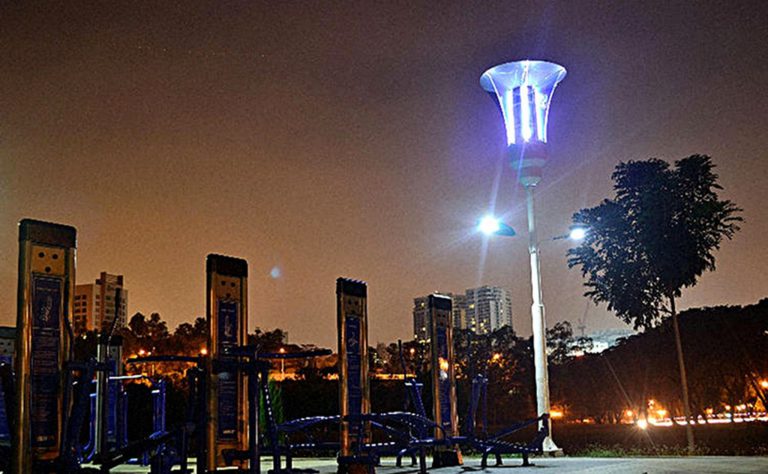
Researchers at Malaysia’s University of Malaya (UM) have developed an outdoor lighting system consisting of an LED street lamp that produces low levels of carbon dioxide (CO2) to trap potential dengue-carrying mosquitoes.
The tropical country has seen an alarming surge in dengue cases in the past couple of years. In the first half of 2015, Malaysia’s Ministry of Health reported a 100 percent increase in total number of deaths due to dengue fever compared to numbers from the previous year, with the death toll set to exceed 200 by the end of 2016.
In an effort to help mitigate the spread of the disease, a team of UM researchers, led by associate professor Dr. Chong Wen Tong, have invented a street lamp that releases a scent similar to that of humans in order to lure health-threatening mosquitoes.
Malaysian researchers invent ‘human-scented’ street light to trap mosquitoes https://t.co/9YUsOrV192 #dengue pic.twitter.com/k8M7RFTWiS
— Asian Correspondent (@AsCorrespondent) 29 February 2016
The innovative street lamp is already in use on a trial basis at UM’s main Kuala Lumpur campus among other locations, and could be seen on the market within a matter of months.
Chong told The Guardian that the Eco-Greenergy outdoor lighting system takes advantage of the mosquito’s sensory abilities by tricking them with features that simulate the odours associated with humans.
“The lamp emits small amounts of CO2, produced by combining ultraviolet light with titanium dioxide, which attracts mosquitoes,” he said.

A diagram of the Eco-Greenergy street lamp. Pic: University of Malaya.
Chong explained that mosquitoes would enter the trap through the capture windows on the upper part of the lamp, and are then sucked into the capture net in the lower part by a suction fan. Once they are sucked into the capture net, they are unable to fly away.
Unlike the lamp posts we normally see on our streets, which generally function via underground wiring, the Eco-Greenergy street light can also be powered by wind and solar energy, making it suitable for areas prone to flooding.
According to Chong, the level of CO2 emitted by the light is relatively low, and the benefits of the clean energy it provides would outweigh the emissions.
normal ppl using ingenuity to solve real problem. Kudos! -Scientist takes on dengue with human-scented street light https://t.co/oeuZunWV6H
— Ivy Kwek (@Kwekii) 29 February 2016
“The battery, wiring system and controller are placed near the top portion of the lamp and can still function even when the water level is 4 meters, depending on how high the post is.
“A sensor can be placed inside the hollow pole to sense the flood water level and transmit a warning signal to search and rescue centers should it exceed a certain height,” he told the Malaysian Insider.
The invention has already won awards at a number of major events.
In many Asian countries, dengue is endemic and as a vaccine has yet to be discovered, the economic cost of the disease is estimated to reach up to US$2 billion a year, not including the costs of chemical fogging, which form the backbone of efforts to control the disease.
Malaysian scientist takes on #dengue with human-scented street light https://t.co/Ze7lZIZTWq pic.twitter.com/Tk43lRpucI
— TODAY (@TODAYonline) 28 February 2016
The dengue virus is commonly carried by the Aedes mosquito, which has distinctive white stripes on its body and legs, and is usually encountered early in the morning or at dusk.
Those who are infected often confuse dengue with a bad flu, as the initial symptoms are quite similar. But the lethargy, fever and joint pains that follow are much worse. In the worst-case scenario, the patient develops hemorrhagic fever, which can often prove deadly.
Spikes in temperatures due to the El Nino phenomenon this year are also causing concern, with the Health Ministry cautioning that the hot weather could cause a 50 percent increase in deadly dengue cases.
This article first appeared on Asian Correspondent.
Image via University of Malaya.
Liked this? Then you’ll love these…
Dishonesty Thrives in Malaysian Academia
Rising cost of living in Malaysia means students can’t afford to eat







